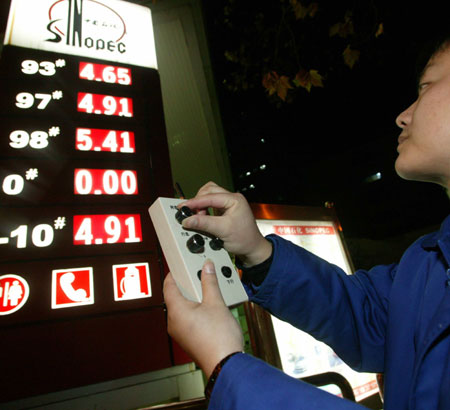Gasoline prices lowered, but not liberated
(China Daily)Updated: 2007-01-15 08:33
According to news reports, the NDRC had earlier been considering de-linking the price peg between local oil products and oil products sold in Singapore, Rotterdam and New York, which had been the standard for the past five years.
 A gas station worker puts on new prices of gasoline on Sunday. China decided to cut the price of gasoline by 220 yuan (US$28) per ton as of January 14. [Xinhua]  |
Analysts' view
Analysts argue that the NDRC should adopt the new pricing system now, while global oil prices are low. Crude oil for February delivery fell to $52.99 a barrel last Friday on the New York Mercantile Exchange. It was the fourth straight weekly decline, according to Bloomberg.
"Naturally, it would be easier for the public to accept a new pricing system that is designed to more accurately reflect global market conditions when the global price is low," said Han Xuegong, a veteran consultant for CNPC.
Cao Xiaoxi, an analyst at Sinopec, struck a similar note. "It would make sense to adopt the new system now. Of course, it is up to the authorities to make the final decision. Besides, oil prices may continue their decline," Cao told China Daily.
Lower fuel prices will benefit China's grass-roots consumers and oil-dependent industries like aviation and public transportation, said Lee Mei Leng, chief analyst at the Beijing office of Platts, a company that monitors the energy sector.
Lee added that the recent price cut for local oil products could prove painful to major refiners, which have long had to contend with high import prices and low retail prices.
However, Han said lower costs for crude imports and reductions in the windfall tax on oil earnings would soften the blow.
A Beijing taxi driver surnamed Chai said he was happy about the news and estimated he would save at least 5 yuan per day (63 cents), thanks to the lower gas prices.
"The government should take into account the interests of both oil enterprises and ordinary consumers," Chai said.
Xu Xiaobing, a Beijing resident who spends 1,200 yuan ($150) per month on gas for his private car, said the lower gas prices reflected the government's desire to adopt international practices.
(China Daily 01/15/2007 page3)
 | 1 | 2 |
(For more biz stories, please visit Industry Updates)
| ||